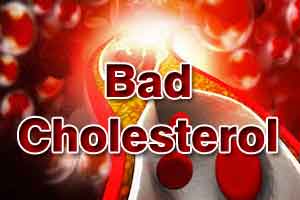- Home
- Editorial
- News
- Practice Guidelines
- Anesthesiology Guidelines
- Cancer Guidelines
- Cardiac Sciences Guidelines
- Critical Care Guidelines
- Dentistry Guidelines
- Dermatology Guidelines
- Diabetes and Endo Guidelines
- Diagnostics Guidelines
- ENT Guidelines
- Featured Practice Guidelines
- Gastroenterology Guidelines
- Geriatrics Guidelines
- Medicine Guidelines
- Nephrology Guidelines
- Neurosciences Guidelines
- Obs and Gynae Guidelines
- Ophthalmology Guidelines
- Orthopaedics Guidelines
- Paediatrics Guidelines
- Psychiatry Guidelines
- Pulmonology Guidelines
- Radiology Guidelines
- Surgery Guidelines
- Urology Guidelines
Raising good cholesterol not as effective as lowering bad cholesterol

Low and very high levels of HDL, or "good cholesterol" are associated with a higher risk of dying from heart disease, cancer and other causes, according to a study in the Journal of the American College of Cardiology. The findings from the first of its kind study suggest that a low level of good cholesterol may not be a heart disease risk factor on its own and that raising HDL does not likely reduce a person's risk of heart disease.
To reduce risk of suffering a cardiac episode, many patients are treated to lower their LDL, or "bad cholesterol," with statins a medication used to block the enzyme needed in the body to produce cholesterol. However, some people don't respond to this treatment, so researchers have been studying HDL and whether raising levels of "good cholesterol" could have the same benefits as lowering "bad cholesterol."
Researchers studied over 631,000 individuals without prior cardiovascular conditions through the CANHEART cohort, a research database that links together multiple individual-level population-based datasets on socio-demographics, cardiac risk factors and comorbidities, medications, etc., in Ontario, Canada. Patients were between 40 and 105 years old, with an average age of 57.2, and lived in Ontario for at least two years as of January 1, 2008. This was the first study to evaluate the association between HDL and death in individuals living in the same environment and exposed to the same health care system.
The study cohort was divided into groups based on their HDL to allow researchers to examine the relationship between HDL levels and mortality. Researchers compared the HDL levels of people with healthier lifestyles to those with less healthy habits. The lowest levels of HDL were seen in people who were socioeconomically disadvantaged and who had less healthy lifestyle behaviors, more cardiac risk factors and more medical comorbidities.
However, even when adjusting for lifestyle factors, lower HDL levels were still associated with increased risk of both cardiovascular death and non-cardiovascular related death, such as death from cancer. Individuals with very high HDL levels had an increased risk of non-cardiovascular related death.
Researchers said their findings are similar to other studies showing low HDL levels are associated with a higher risk of cardiovascular disease death, but this study is among the first to show a similar relationship between HDL and cancer death and other causes of death.
Researchers said they are unsure why very high levels of HDL increased levels of non-cardiovascular related death, but other studies have suggested this could be related to increased alcohol intake.
In conclusion, researchers said this study casts doubt on HDL being used as an independent risk factor for cardiovascular disease or for raising HDL levels to be used by itself as an intervention to reduce the risk of dying from heart disease.
"The link between good cholesterol and heart disease is complex, but it seems certain that there is a connection between people with low good cholesterol levels and other well-known risk factors for heart disease such as poor diet and exercise habits and other medical conditions," said Dennis T. Ko, M.D., M.Sc., lead author of the study and an associate professor at the Institute for Clinical Evaluative Sciences in Toronto. "Focusing on raising HDL is likely not going to help these patients, but these findings show that one of the best interventions in treating and preventing heart disease continues to be lifestyle changes."
Limitations of the study include that researchers were unable to examine some potentially important aspects of HDL such as the relationship of particle sizes, subclasses or function with cardiovascular or non-cardiovascular mortality because these data are not available at the population level. Also, they did not have smoking status or alcohol use data for the entire population studied, but were able to supplement that data from an additional survey.

Disclaimer: This site is primarily intended for healthcare professionals. Any content/information on this website does not replace the advice of medical and/or health professionals and should not be construed as medical/diagnostic advice/endorsement or prescription. Use of this site is subject to our terms of use, privacy policy, advertisement policy. © 2020 Minerva Medical Treatment Pvt Ltd